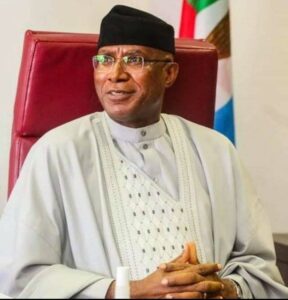THE QUESTION OF STANDARD AND PATRONAGE OF MADE IN NIGERIA GOODS – WHAT FUTURE PROSPECTS
Zik Gbemre
It is a known fact that one of the quickest way for any society to holistically transform from being a developing economy to an advanced modern society, which offers the best living standard for its populace, is for that society to go through an Industrial revolution, especially in the area of manufacturing. But this is one hurdle which past and present Nigerian governments have not been able to successfully cross. And as a result of this underdevelopment of the industrial sector, Nigeria has become a hot-spot/market place in Africa where all manner of substandard products are made to thrive. Though there are so many factors that have contributed to this pathetic state, the numbers of factor however, is the unavailability of a reliable power sector, and of course, governments stringent and business-unfriendly policies and practices.
It is funny how most goods and products used today in Nigeria are imported from foreign lands, including African countries. The sad part is that most of these goods/products are substandard. In fact, even foreign manufacturing companies are aware that Nigeria is actually a dumping ground for substandard goods/products. This is so simply because the country’s manufacturing sector has not been developed to be able to adequately meet the demands of the enormous Nigerian populace. Hence, some marketers, driven purely by insatiable greed, are cashing on this lacuna to specially ask foreign manufacturers, especially those in China, to produce substandard goods/products at a cheaper cost price, and export same to Nigeria to make double the profit. Even in the midst of this anomaly that is not regulated by relevant authorities like the Standard Organization of Nigeria (SON), some high quality made in Nigeria goods/products, are not even patronized by some foreign companies and multinationals operating in the country. Rather, they prefer to patronize the foreign ones.
Agreed that the country is flooded with fake and substandard goods/products from both domestic and foreign lands, however, Nigerians are also known to patronize high quality made-in-Nigeria products like electric cables/wires, tyres, papers, iron-rods, etc. in fact, Made in Nigeria electric wires/cables for instance, are regarded amongst the best in the world compared to those imported from China, Taiwan and Japan.
This fact was reiterated recently by Engrr. Ifeanyi Uzodike, who is the President of the Cable Manufactures Association of Nigeria (CAMAN), and CEO of Cutix Plc, in an interview with The Guardian Newspaper when he was asked what his assessment of the cable industry in Nigeria? In his words, Uzodike noted that “Ordinarily, the cable industry in Nigeria should be doing well, but the lack of support and favourable policies from government is hindering the progress”. The Nigerian cable industry is the only industry where you are assured that the local manufacturers produce better quality products than foreigners. Yet, you find a lot of adulterated products coming into the country.
“I want to suggest that there are many things to be done to salvage the situation. For example, in Lagos, you will see major projects and buildings under construction, and you reason that if any of the cable manufacturers get hold of the contracts, their year is made. But, all those contractors are allowed to import low voltage cables that all Nigerian cable companies can produce. We suspect – we haven’t gotten concrete information, yet – that those contractors are allowed to import those cables duty-free. If a government wants to encourage local manufacturers in the industry, how can it allow contractors to bring in cables that can be made in your country at a cheaper rate? What is incentive for me, as a manufacturer to stay in that industry? Shouldn’t I close down and become an importer? There are companies, especially the multinationals who are based in Lagos who will never patronize a Nigerian company.
“Again, the Standard Organization of Nigeria (SON) is the major regulator. However, to import goods into Nigeria you must acquire what is known as SON CAP, which is a permit. The same thing applies to a trader who wants to import cables. And when you go around in markets, traders will tell you that they all have SON CAP permit. This means that they would go and acquire the permits and then flood the market with nonsense. If SON must issue a permit to a trader to import cables, they have an obligation to ensure that what the trader imports are standard quality products. Most times, some of the traders do not import quality products.”
With the above analysis of the deplorable situation in the country, we cannot help but ask what then is the essence of having a government regulatory body like SON; when both manufacturers and importers are given the license to import whatever they like without being questioned or regulated. We seriously do not know why we have SON in the first place. Like we have reiterated before now, if the whole essence and purpose of having a Standard Organization of Nigeria is defeated, then the body should be done away with completely. SON should be scrapped completely if they cannot ensure and regulate the observed influx of fake and substandard goods/products into the country.
On one of the ways forward, Engrr. Uzodike made this suggestion: “I would like to make the suggestion that traders who import cables should not be allowed to use the NIS label. The NIS mark or label should be reserved for manufacturers in Nigeria, who have been visited by officials of SON over a period of time (and when your products have been confirmed to be of good quality, they issue you that mark). But these traders who import substandard products have the NIS mark on their packs. As a manufacturer, you make the NIS mark yourself, the SON gives you a letter saying you have been awarded the NIS certificate. What people do now is to make a stamp pad and stamp the mark on their labels. So people who import cables even stamp it on their wares. And, in the real sense, there is no way an imported cable can have the NIS mark. The issuance of SON CAP permit to traders has lead to the influx of substandard cables. I know that the intention of the SON is not to enable people bring in poor quality products, but to encourage trade. But, in doing that, they have no way of checking what the people bring in. It is a big problem”, he noted.
We still recall how some few years ago, a report on the quality of Nigerian products, especially consumer goods, accused the nation’s manufacturing firms of deliberately churning out substandard products in order to enhance their competitiveness and survival in the economy. The report, which was a product of a six-month survey by an indigenous marketing research organization, Market Plus Products Services, titled: “Declining Product and Quality Trend in Nigerian Manufacturing sector,’ said only 15 percent of locally manufactured goods met the expected standards.
Conversely, the report said 85 percent of locally manufactured consumer goods were found to be of inferior quality, compared with what obtained for similar products in neighbouring countries. The report, which adopted a survey stratum that bench-marked products quality assessment on popular brands and comparative standards in the neighbouring countries, revealed that the same or similar products in Nigeria failed the quality test and opinion ratings by consumers.
According to the Managing Director of the market research organization, Dr. Remos Paschal who described this as a preview of a full-scale report based on general survey, he said the report specifically found products and popular brands manufactured by big multinational operating firms in the country below standard. He stressed that “what they manufacture for the various neighbouring countries,’ markets in the sub-region, including Ghana, Senegal and Cote d’ Ivoire, among others, are superior to similar products and brands meant for the Nigerian Market or manufactured in Nigeria.” He said, “At the end of the six months of a four-country survey (covering Nigeria, Ghana Senegal and Cote d’ Ivoire), it became clear that most of the leading manufacturers in Nigeria are not adhering to standards in terms of quality of their products. Mostly guilty are those in consumer goods manufacturing, except for Nigerian manufactured pharmaceuticals products which found to be equal or sometimes, higher standards.” We think this is rather unfortunate, to have big multi nationals operating in the country who produce goods of inferior quality for the Nigeria markets, while the same or similar goods meant for other sub-regional countries are of higher standards.
This is obviously unacceptable and we wonder what the Standard Organization of Nigeria (SON) and other product-standard regulatory agencies in the country have been doing about this anomaly? It is very disturbing that big time manufacturers are the ones guilty of this partial production/distribution of substandard products/goods in the African sub-region. Aside insatiable ‘greed’ and sheer wickedness, there are other factors that have over the years, driven manufacturers in Nigeria to cut-corners and produce substandard goods for the Nigerian consumer.
For instance, the importance of an effective power sector going hand-in-hand with the manufacturing industry cannot be over-emphasized. In other words, no manufacturing industry can succeed without an effective power sector. But despite its importance, manufacturers and industries in Nigeria are made to go through tough times because of the epileptic power supply situation in the country. With this, what future prospect do manufacturers in the country have with regards to the pathetic situation in the power sector?
Sometime ago, the Manufacturers Association of Nigeria (MAN) expressly urged President Goodluck Jonathan to pursue the power sector reform agenda as a matter of “national emergency.” They also canvassed for stiffer penalty against importers of fake products, increased financial intervention in the industrial sector, more patronage of locally manufactured products and increased public-private partnership. The stakeholder reiterated that a vibrant manufacturing sector is critical to government’s actualization of its economic revival agenda and that regular power supply is an imperative. The truth is that, the manufacturing sector has great values, and if carefully monitored and well supported, it can solve many of our problems as a nation, especially unemployment. If manufacturing thrives and capacity utilization increases, the whole economy benefits. For instance, the employment generation capacity of manufacturing is enormous. That is why the sector deserves priority attention. Regular power supply is so important, not only to manufacturers, but also in our everyday life.
Doubtless, when there is sustained effective power supply, there will be more employment opportunities, increase in income, improved life expectancy and better conditions of life. It is the ‘engine room’ of industries and the key for enhanced economic activities. In fact, the present developed nations like Britain, Spain, USA, and so on, came to be through their Industrial Revolutions in the 18th and 19th centuries. And since then, they have maintained that position of being the century’s industrial giants that other nations look up to. Even countries like Japan and China are thriving in their area. Considering the fact that virtually everything used by man today to support and sustain life, are produced in industries, especially when they are required in commercial quantities for domestic and export use. It then becomes expedient for custodians of the nations resources to do whatever that needs to be done to develop the industrial sector.
No nation can aspire towards development without going through an industrial transformation that is built on an effective power supply. No government can end poverty without industries. Having this understanding should make the Nigerian government to take appropriate steps in improving the situation in the industrial sector.
The situation in the nation’s power sector is so bad that it has made many industries and manufacturers to either fold-up or do the unthinkable just to sustain their business and remain competitive. It has also made prospective investors to look from distance. In fact, many of them have even relocated their businesses to other neighboring African countries like Ghana and also South Africa. Today, many Nigerians, industries/manufacturers have resorted to the use of generators because the nation’s power operators have not been able to provide required power supply for the growing population. This has made the Nigeria economy as one that is “generator-driven.”
As a result of the high cost of production faced by manufacturers in the country, part of which is due to the inefficient power supply, they have resorted to manufacturing substandard and inferior products and flood same to the Nigerian market. Countless made-in-Nigeria products/goods cannot be exported to some countries because of their inferior quality. To many, that is the only way they can remain in business, because of the epileptic power supply and unfriendly business environment. No serious business can establish in a country where power supply is dodgy. Good profit is what business (no matter how small or big) is all about. And for that to happen there has to be quality production on a large scale ‘at a minimum possible cost.’ This cannot be achieved where there is no regular and effective power supply. Imagine one who produces bottled and sachet water is made to use a 100KVA generator to operate the machines meant for the production. And N30,000 worth of diesel is spent every four hours to produce a sizeable quantity of water that is not even up to the amount spent to produce them. How can such a business thrive? That is the predicament faced by so many small and medium scale manufacturers/businesses in the country.
Notwithstanding, the nation’s epileptic power supply and strangulating government policies not friendly-enough to the industrial sector, are no excuse for manufacturers, particularly foreign manufacturers, in Nigeria to cut corners in the production of consumer goods meant for the Nigerian market, whereas the same or similar goods meant for other sub-region nations are made to be of high standard. The reason why this is so is because the relevant government agencies and laws are not proactive enough to address this anomaly. Countries like the USA are known to patronize Japanese-made products. But they ensure that Japan produces the goods (be it cars or clothing) according to their specified high standard. Anything short of the specification is not acceptable. But the reverse is the case with Nigerian manufacturers and business men/women. Nigerian manufacturers and business men/women are known to go to China and request for the mass production of consumer goods of inferior quality to flood same into the Nigerian market for more profits.
This unholy attitude in business by some Nigerian manufacturers is obviously costing Nigerians their hard-earned money. They negotiate with these companies in Asia to lower the quality of consumer goods meant for the Nigerian market, so that they can pay less for cost of production but earn more in sales. Products like generator sets, car spare parts, smart phones, electronics/electrical materials etc. are all some of the consumer goods that are flooded with fake substitutes. The one that is most disturbing is the purposeful production of fake consumer goods/items that have led to the loss of lives and property. The influx of fake drugs for instance, has been a thorn in the flesh for government agencies like NAFDAC to effectively eradicate considerably. Despite their concerted efforts, especially when late Dr. Mrs. Dora Akunyili was the Director General of NAFDAC, fake drug is still costing the nation greatly. Not to mention substandard electrical appliances that have caused fire outbreaks, leading to loss of lives and property.
While we strongly condemn these unholy attitudes exhibited by Nigerian manufacturers and business men/women in their greed to make more money, we equally urge that they should change from their unfriendly-business-traits. It is better for us to have few quality goods of high standard than to have inferior products to flood our markets. We also urge the relevant government regulatory agencies like SON, to stiffen their operations in checking the partial characteristics of Nigerian and foreign manufacturers who produce standard goods meant for other markets in the African sub-region, while they produce substandard ones for Nigeria. We equally urge the Federal Government and our lawmakers to provide the enabling environment conducive enough for industries to thrive, and also make laws that would encourage investors and industrialists as well. Let the right thing be done, this we urge.
Zik Gbemre, JP
National Coordinator
Niger Delta Peace Coalition (NDPC)



